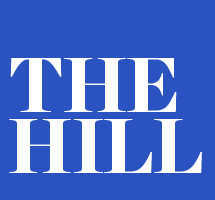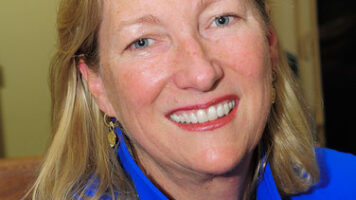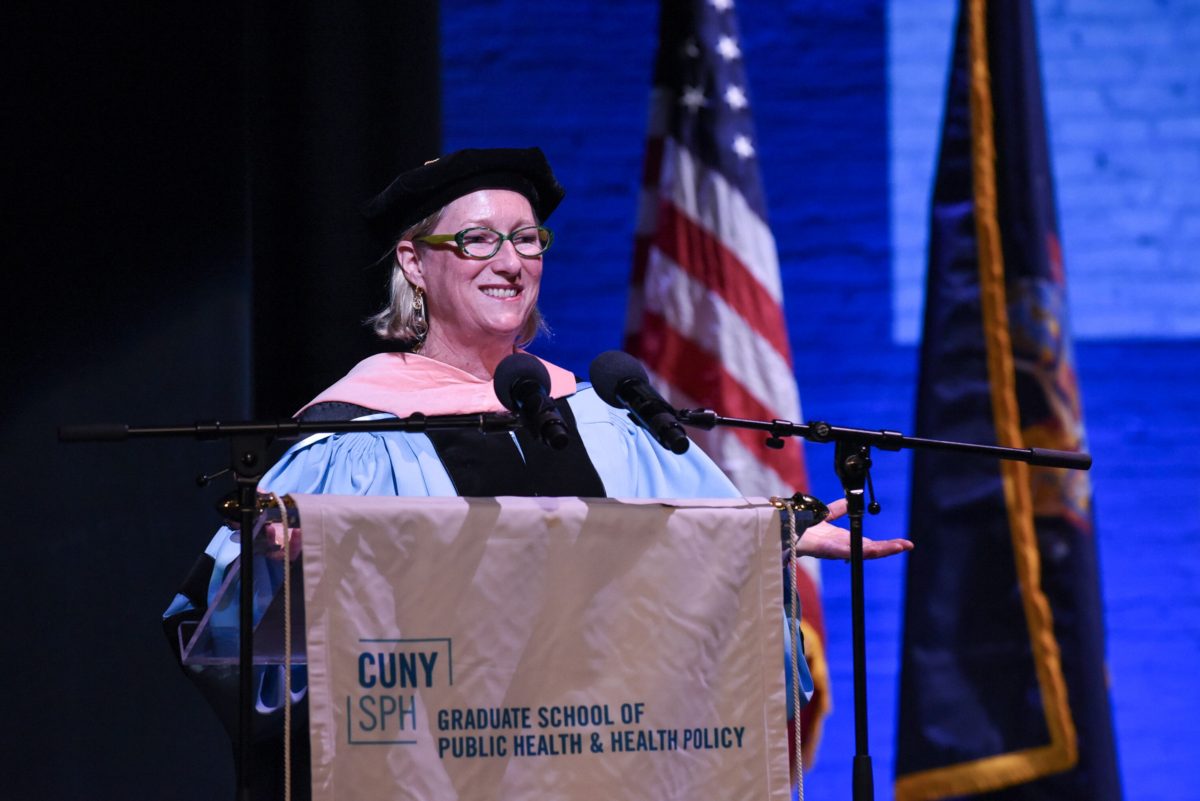Here is the full text of Dr. Haviland’s acceptance speech before the graduating class of 2019 at the City University of New York’s (CUNY) Graduate School of Public Health and Health Policy:
Thank you, Dean El Mohandes.
I am delighted to be here tonight, with Dr. Nabarro, Trustee Berger, CUNY faculty, my family (especially my husband Tom), honored guests and most importantly with you– the graduating class.
It is truly an honor to share with you two key lessons I have learned in three decades of working in public health – lessons that resonate both here in the United States and around the globe.
In thinking about what might be useful to impart on a night like tonight, I realized that two issues have been central to my career and to my life – and I hope they will be similarly central to you as you leave CUNY and build your own journey in public health research and practice.
At the end of the day, for me, the central values we espouse in public health are boldness and persistence.
I think both are essential — since our mission is nothing less than to change the world and to deliver on the promise of achieving social justice and health equity.
I find it highly ironic that I am going to talk with you about either boldness or persistence. Because I would tell you, I never thought of myself as a risk taker or as that annoying and persistent “never say die” kind-of-person, who no matter what continues a challenge long after most people have given up.
But here we are – and here I go.
In 1984, knowing nothing about public health, I chose bold and I got on a plane to the Philippines to a refugee camp on the edge of the South China Sea.
In Palawan, at the Philippine First Asylum Refugee Center, I learned fundamental lessons about public health.
Really just the basics, like the centrality of access to water and sanitation, the need for quarantine and disease control, nutrition 101, the reality that housing is a public health issue, and the miracle of immunization, (obviously that was before the internet tried to tell us that vaccines are non-essential or dangerous).
But more importantly, I learned about the difference between what I might want and what I really need. I learned this from refugees who had few material possessions – yet they were enormously generous to me. One family sold their only extra shirt to buy a chicken to feed me a final dinner as they left the refugee camp.
Living in a refugee camp teaches you humility, gratitude and a commitment to building a safer world for all.
Today we live in a world where more people than ever are displaced by war, famine, and environmental disasters (the United Nations estimates more than 66 million are currently displaced).
I can tell you with certainty that no one leaves their home country on a whim, and no one wakes up with a sudden desire to become a refugee.
People leave their homes and their countries because they have no choice but to undertake a dangerous journey to an uncertain future.
Refugees and immigrants deserve our compassion and our support – not deportation, incarceration and abuse.
Many in our government don’t seem to share this point-of-view. But we must never lose sight of it. Because being bold demands that we ask questions and always remain committed to doing what is right and address fundamental injustices in politics, policies and practice.
This is the core of public health – and this is the bold career you have chosen.
In my experience, bold can come in many forms. One of the boldest things I have ever done is to learn how to listen. Not to listen for the answer I want or expect — but to listen closely to someone’s experience, especially when they talk about something they need. Sometimes my most important role is simply to remove barriers and let community-driven solutions unfold so that people can access the goods or services that can improve their lives.
In camps around the region, refugees shared their fears, their dreams and their aspirations with me. And I worked to improve their living conditions and accelerate their resettlement. When they spoke, I listened – and I learned fundamental facts about the human condition and the world we share.
Change happens when we are bold enough to ask questions – and to hold the space open for others to speak.
As public health practitioners, you must be bold and listen to what is said — and find a way to listen to what is left unsaid.
In public health, we are called to be bold every day.
The world can be an unjust place. Everyday people are dying of preventable illness, or suffering without the care they need. Our national and multi-national systems are flawed by institutional bias and racism, and often fail to deliver comprehensive or compassionate care.
Bold means that we must acknowledge this injustice.
Every day, I work to deploy data to illuminate this fact, talking bold truths to power in the halls of Congress in an effort to effect change. I do not accept that gross injustice in access to health care must persist. It’s what being bold demands.
Health care is a fundamental human right. And you, as public health professionals, are on the front line of this fight.
I started my career in the US Refugee Service organizing the care, feeding and protection of refugees fleeing war and oppression. Today I work to create systems and policies that prioritize prevention and address systematic bias.
I chose bold because, for me, there was no other choice.
My question for you tonight is – how will you be bold?
You, the graduates, with the support and guidance of this most amazing faculty, have already taken the first step. Your degrees, your research and your practice all demonstrate bold thinking, brave hearts and dogged persistence.
In choosing public health, you have chosen the road less taken – and the path most needed.
My second lesson is simple – a career in public health requires a commitment to persistence.
The problems you chose to focus on will take time, imagination, and bold thinking to solve.
I am confident that you are already imagining new solutions, new partnerships and new ways to communicate about the importance of health equity and social justice. And I am so excited to see how you will improve the health and wellbeing of our city and the nation.
Communities, families, patients and people need you – and they need your relentless pursuit of truth and justice.
As public health professionals, we are hard wired to never accept the status quo – but rather to be annoyingly persistent in our fight to create a better, healthier reality, where every person has access to the building blocks of a dignified life, regardless of their race, their gender, their sexual preference, their age, or their geography.
The byproduct of this steadfast commitment is a world filled with healthier people – who represent the cornerstone of thriving communities, countries and economies.
With your leadership, geography will not be a de facto predictor of mortality or morbidity.
As public health professionals you have the unique skills and ability to confront injustice. But you also know that lasting solutions will not come overnight.
With persistence and generosity of spirit, you can create new and broad coalitions of unlikely bedfellows – uniting communities around a shared vision of health for all, and at all ages.
Public health is a force multiplier working to create a healthier future for everyone.
In the days and years ahead, I urge you to support your colleagues, mentor the next generation – and work tirelessly to build a bold new vision of a healthier tomorrow.
Thank you.



